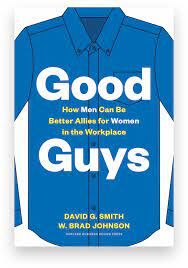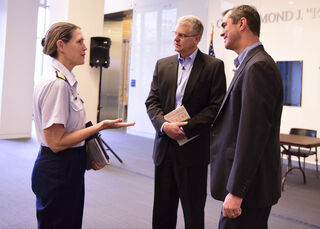Gender
The Support Women Need From Men at Home and at Work
Advocacy, mentoring, and equality make powerful gifts.
Posted May 12, 2021 Reviewed by Ekua Hagan
Key points
- Advocating for gender and pay equality is much easier when using the right phrasing and language.
- Refusing a free pass to "locker room talk" or sexist jokes helps to develop a more inclusive culture.
- Formal mentoring programs provide transparent encouragement for women to rise and succeed in the workforce.
We just celebrated Mother’s Day. No doubt cards and floral arrangements showed that women are appreciated and matter. Beyond tangible gifts, concrete steps—actions that men make—show this throughout each year.

In Good Guys: How Men Can Be Better Allies for Women in the Workplace, David G. Smith and W. Brad Johnson focus on gender, work, and family equality.
W. Brad Johnson teaches psychology at the U.S. Naval Academy and as faculty associate professor for Johns Hopkins University. He’s a former lieutenant commander in the Navy’s Medical Services Corps.
David G. Smith teaches sociology at the U.S. Naval War College. The two co-wrote Athena Rising: How and Why Men Should Mentor Women years ago.
Smith first became aware of gender inequality while attending the United States Naval Academy in the early 1980s. Then, women accounted for fewer than 10 percent of the student body. Though these numbers have risen, the authors have seen bias in their research of performance evaluations, retention of women and dual-career families.
Women, who are more likely to have retail, hospitality, healthcare, and teaching careers, have been greatly affected by the pandemic. Females have also historically borne the brunt of household and childcare duties, often impacting the time they could devote to their professions. This dynamic sets up inequality, which the authors put out there to recognize and change.
How do we get beyond this and help men, women and future generations live a more equitable life? Here are a few of their ideas:
Help Around the Home
“Pull your weight at home,” say Smith and Johnson. “Consistently do at least half of the domestic work at home and share more of the load as needed based on your partner’s work schedule and stress level.”
So, too, the authors suggest that sons, in particular, are watching the relationship dynamics that play out in their homes. We know that one’s family of origin teaches us about relationship dynamics. To encourage that along, the book offers daily actions for domestic allies. Such tasks as keeping track of food needs, shopping, scheduling the kids’ activities, helping with homework are only a few examples.
Adjust Attitudes
The first chapter title in Good Guys is “Men: The Missing Ingredient in Gender Equality” while the text explains obvious advice (don’t harass women, curb sexist language) as well as offering encouragement (mentor women and advocate for gender equality at work) and not-so-obvious suggestions (stop making assumptions of women and listen effectively).

The book discusses bystander paralysis as a real phenomenon to reckon with, in that many profess to be allies for equality in private, but when in public succumb to the sidelines, never taking a position, tolerating or perpetuating sexism.
There’s a handy list of ready responses to sexist comments or jokes. Replies like “we don’t do that here,” “that wasn’t funny,” or the very honest phrase “actually, that’s just a bad stereotype” provide phrasing that, sadly, some at work or in life may never have used … and should.
The authors are quite direct when it comes to suggestive humor or raunchy jokes that get chalked up to locker room talk. “Men need to make it clear that these boys can either grow up or take their juvenescent behavior (and their pink slip) elsewhere,” they write.
Make Workplace Mentoring Mandatory
Smith and Johnson have both found that formal mentoring programs create a transparent reason for men to be in that actively encouraging role. Mentoring in a group or cohort with multiple team members (male and female) helps also.
If men didn’t have working mothers, sisters, and female friends on a forward trajectory of educational or business success, an almost palpable anxiety can set in. So, too, some men have never truly experienced non-sexual, close relationships with females.
Other barriers may be ignorance of the idea in the first place, of getting mentoring wrong, or worry that motives will be judged.
Some men might fear what their wives or significant others would think of a mentor-mentee relationship. Most in the psychology/counseling world would suggest that this automatic thought deserves exploration, for it might be just that, a knee-jerk, reactive worry that doesn’t truly hold water. If indeed this worry does exist, it says much more about the underpinnings of such a marriage or relationship than any negative attributed to a successful business approach.
If a formal mentoring program isn’t an option, the authors suggest that leadership in an organization or company should add mentoring as part of job descriptions for managers. This holds managers accountable and may be a component of future job performance evaluations.

Good Guys is full of other gems: bold phrasing vs. faint praise, how to be the change in your organization, hiring diverse talent, developing pay equity, as well as what it takes to create flexible work options so all employees may thrive.
The chapter note citations prove the research that went into this project and propelled it to become a solid reference, not merely author opinion.
Perhaps the words “ally” and “allyship,” which Smith and Johnson use many times over, provide the best summary of their mission. We can all be a part of this journey to be an ally to equality.
Copyright @ 2021 by Loriann Oberlin. All Rights Reserved.
References
D.G. Smith and W.B. Johnson, Good Guys: How Men Can Be Better Allies for Women in the Workplace, Boston, MA: Harvard Business Review Press, 2020.




